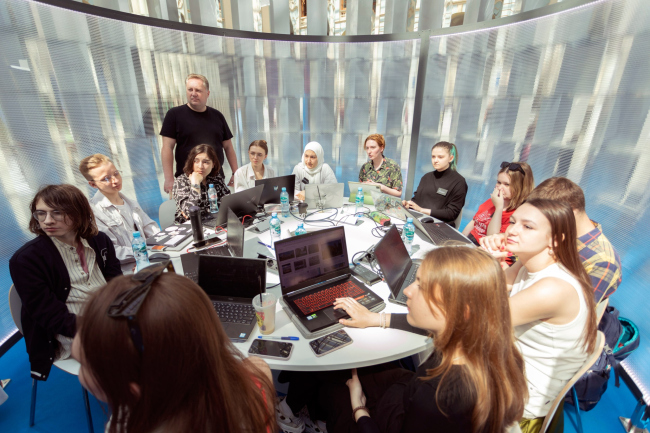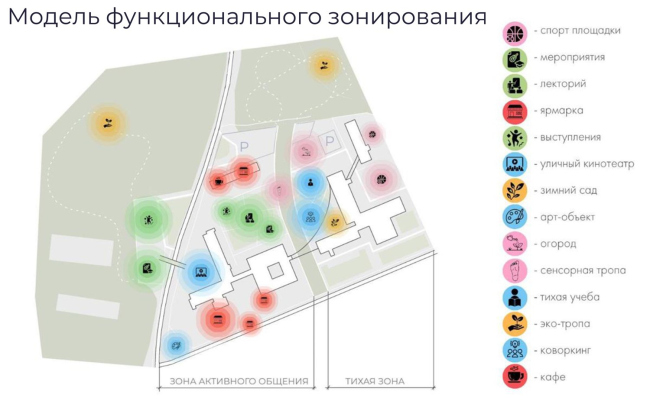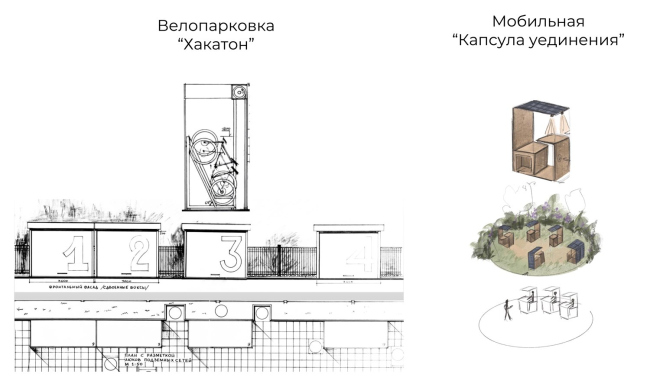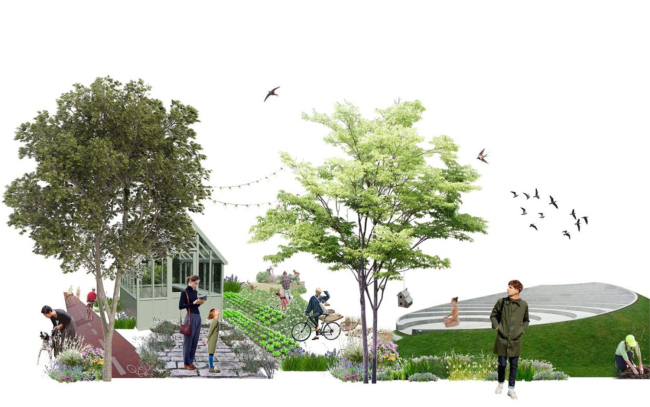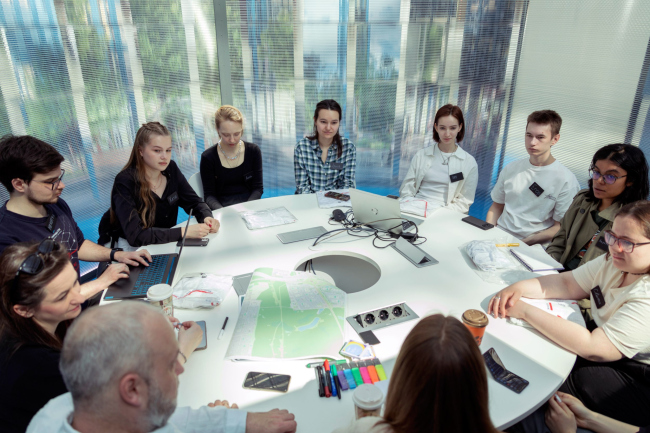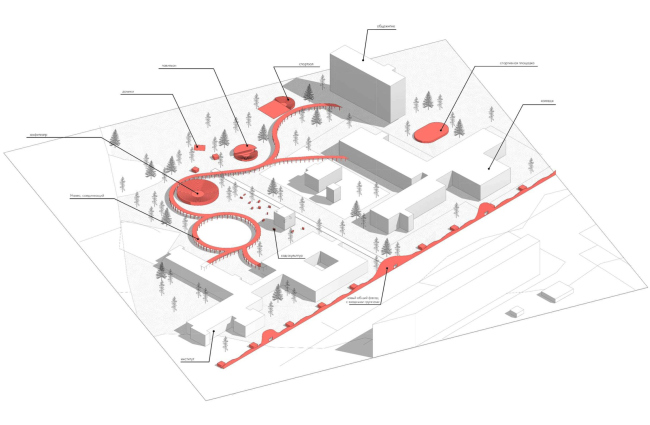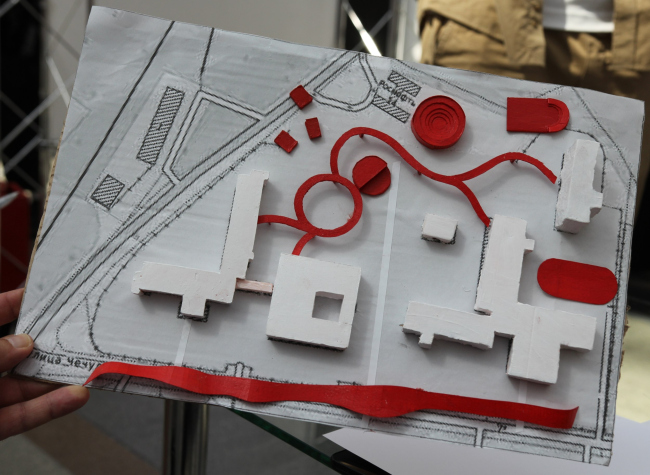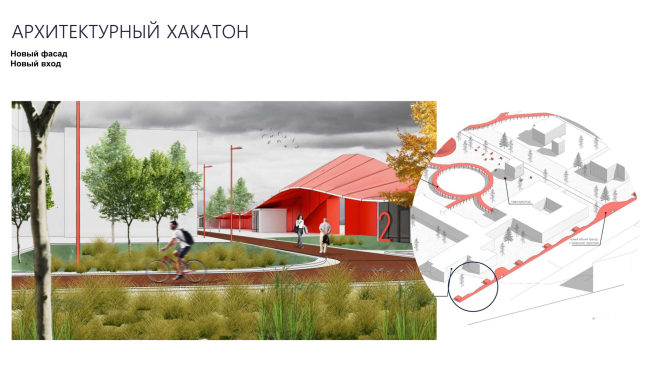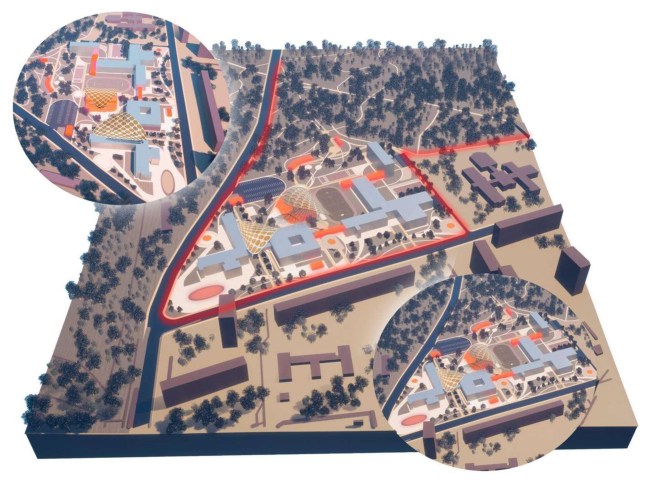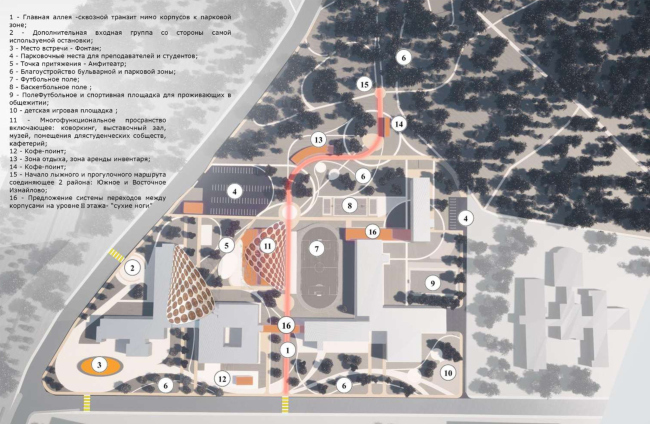|
Published on Archi.ru (https://archi.ru) |
|
| 11.06.2024 | |
|
Campus within a Day |
|
|
Julia Tarabarina |
|
| Studio: | |
| Genplan Institute of Moscow | |
|
In this article, we talk about what the participants of Genplan Institute of Moscow’s hackathon were doing at the MosComArchitecture booth at the “ArchMoscow” exhibition. We also discuss who won the prize and why, and what can be done with the territory of a small university on the outskirts of Moscow. Few would agree that a university campus project, even a small one, can be created in just a day, even in its most preliminary concept form. Nevertheless, we know that such things do happen sometimes. Another thing that we know is that hackathons are popular because they mobilize both feelings and thoughts in people. 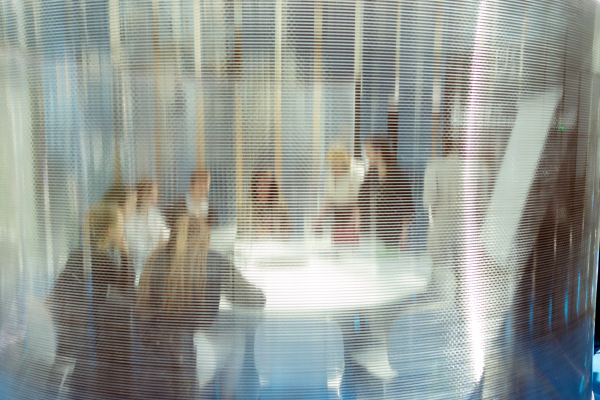 The teams were working at the Moscomarchitecture stand behind a polycarbonate wall, but it was possible to take a sneak peek insideCopyright: Photograph © Provided by Genplan Institute of Moscow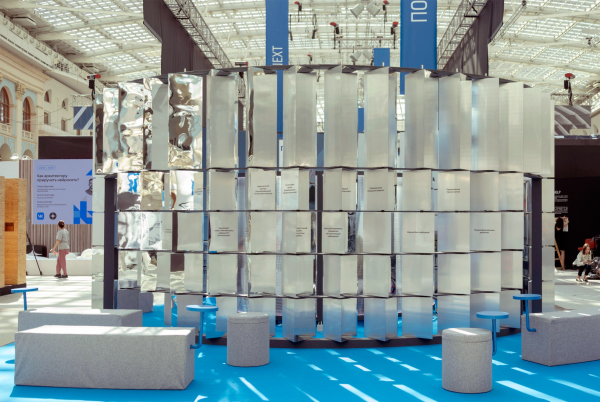 The MCA booth where the hackathon was held was dedicated to the new Moscow campuses, with three projects of varying degrees of readiness displayed on the outside of the stand in the form of a prismatronCopyright: Photograph © Provided by Genplan Institute of MoscowStudents participating in the hackathon were asked to come up with proposals for the territory of Moscow City Pedagogical University. All three teams worked on the same task but autonomously, and on different days. The university in question is small and located in the eastern part of Moscow, on the edge of a district nestled between Izmailovo and the Moscow Ring Road; it is bordered by a park on two sides. The campus includes two academic buildings, one built in 1987 and the other in 2002, both three stories high, with a characteristic cross-like plan aimed at maximizing light exposure in the classrooms – charming buildings with calm white-pink facades, and an 11-story dormitory deeper in the territory. There is practically no landscaping on the grounds, although some time ago it was the site of the only landscape design college in the country. Currently, the faculties of natural sciences and sports are located here. The entire territory is fenced, and inside, besides the three buildings, there is a square with a characteristic circular path and an open stadium situated next to the eastern boundary. 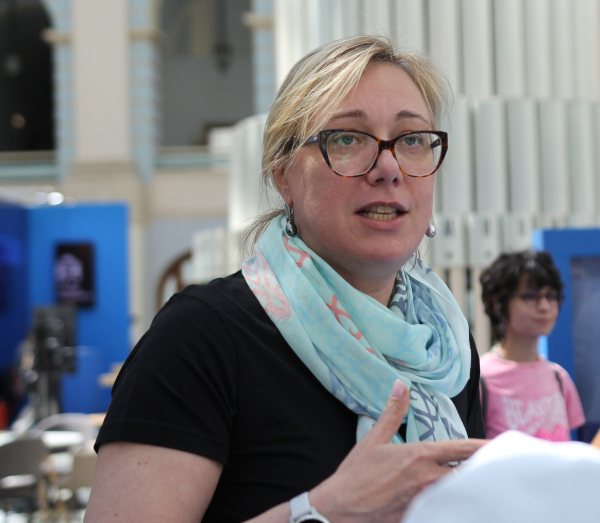 Tatiana Guk announces the winner of the hackathon at the stand of the MCA and the Genplan Institute of MoscowCopyright: Photograph © Julia Tarabarina, Archi.ru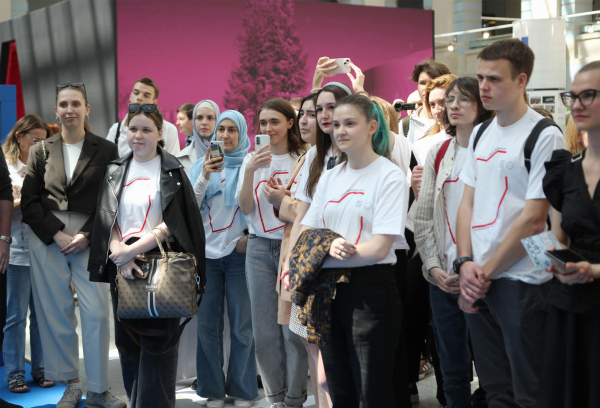 The winner announcement. The hackathon organized by Genplan Institute of Moscow and MosComArchitectura at ArchMoscow 2024Copyright: Photograph © Julia Tarabarina, Archi.ruAs expected in our times, the proposals leaned towards creating public spaces, co-working areas, and overpasses between buildings – surprisingly absent until now. Additionally, there was a focus on at least partially opening up the campus to the city and local residents: two teams suggested a thoroughfare running through the campus to the park, while one team concentrated on “intensifying” the only city street adjoining the university grounds, notably named after the architect Chechulin.  , Genplan Institute of Moscow All the contestants worked heroically and showed interesting results – as much as it is at all possible when brainstorming is limited to just one day. Such experiments are useful both for students and tutors – and for the university too; we saw the interest of the customer, a representative of Moscow City University was on the jury and it is obvious that the ideas expressed by the participants aroused the interest of the university administration. Yes, the prize went to just one team – that was the rule in this case – but I would like to emphasize that each proposal had its own strengths. Appreciating the efforts of all teams, we decided to award two second places in addition to the first. There is one winner and two second-place holders: 1st Place / Poznanie (“Cognition”) Team 3, the authors of “Cognition” projectCopyright: Photograph © Provided by Genplan Institute of MoscowCurators: Alexander Kotenkov, Deputy Head of the Department of Prospective Projects at the Genplan Institute of Moscow, Maria Pomelova, architectural company “Chekharda” Students: Alina Arakcheeva / MITU-MASI, Margarita Vykhodtseva / MARKHI, Anastasia Gavrik / GUZ, Anastasia Gracheva / SPbPU, Valeria Degtyareva / MARCH, Ksenia Kaspirovich / MARKHI, Alexander Kovriga / MARKHI, Igor Oskolkov / KGASU, Nikita Pavlov / HSE, Kamilya Khiyasova / GUZ, Anna Chvilyova / KubSU 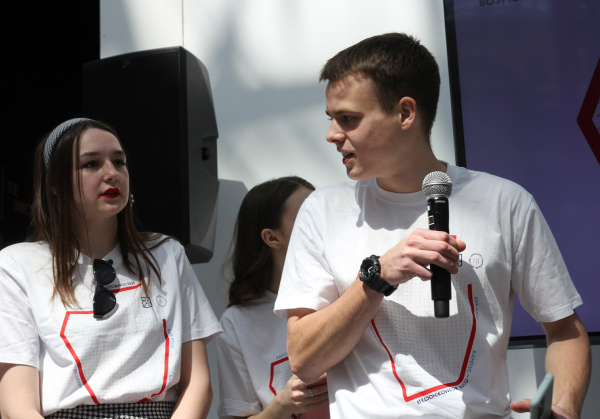 The hackathon organized by Genplan Institute of Moscow and MosComArchitectura at ArchMoscow 2024Copyright: Photograph © Provided by Genplan Institute of Moscow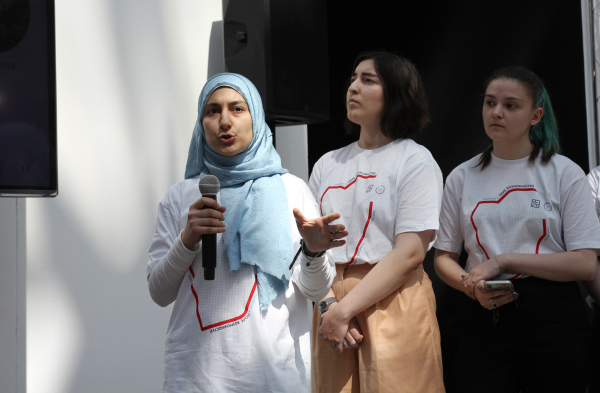 The hackathon organized by Genplan Institute of Moscow and MosComArchitectura at ArchMoscow 2024Copyright: Photograph © Julia Tarabarina, Archi.ruThis team, the largest, worked on the last day and was known for pulling an all-nighter to complete their project, resulting in the most visual content. However, as noted by Andrey Gnezdilov, there was no “master plan” – the team didn’t present an actual transformation plan for the campus territory but rather focused on a collection of proposals not consolidated into a cohesive whole. Perhaps this was for the best, as they offered numerous “growth points”. “Cognition” project, the hackathon winnerCopyright: Hackathon of the Genplan Institute of Moscow, Group 3Like other teams, they proposed utilizing the park but, unlike their peers, extended a bridge to it: on the western end of the park, they placed a stage, and on the eastern end, in a nook of the academic building, a summer cinema. Another “performance space” predictably found its place in the square. The stadium remained in the eastern part, where it originally was. The team connected the dormitory and the two academic buildings with overpasses; naturally, these are necessary. However, the function of the old (eastern) building remains uncertain after the Design and Technology Faculty moved out in 2015. In the building’s northeast corner, the team proposed a winter garden combined with a covered walkway. The conceptual framework of the project was defined by the architects as activating different senses: taste, sight, hearing, touch, smell... Additionally, they proposed a “sensory alley” along the city street where all these senses converge. This is a beautiful approach to explaining the functional program, making the campus image less dull. The only questionable element might be the “Five Senses” art object proposed by the team, which resembles a lollipop with five legs. However, its role in this rapid research is minimal. 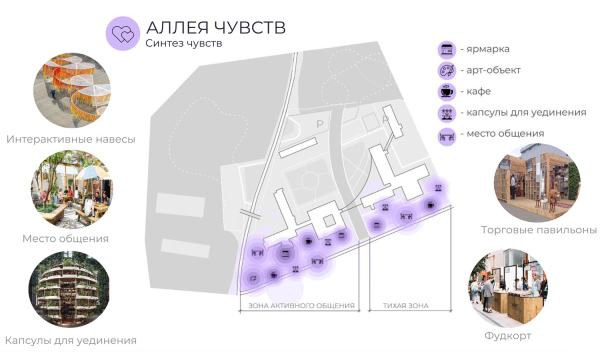 “Cognition” project, the hackathon winnerCopyright: Hackathon of the Genplan Institute of Moscow, Group 3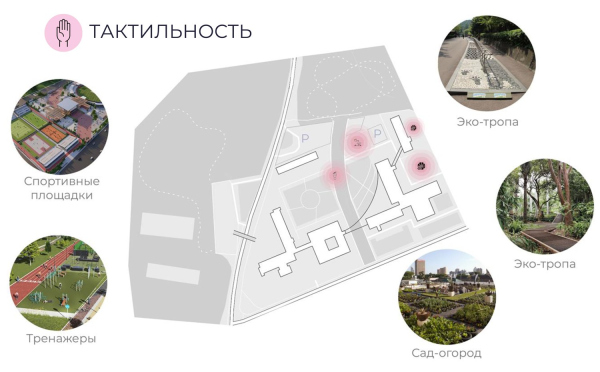 “Cognition” project, the hackathon winnerCopyright: Hackathon of the Genplan Institute of Moscow, Group 3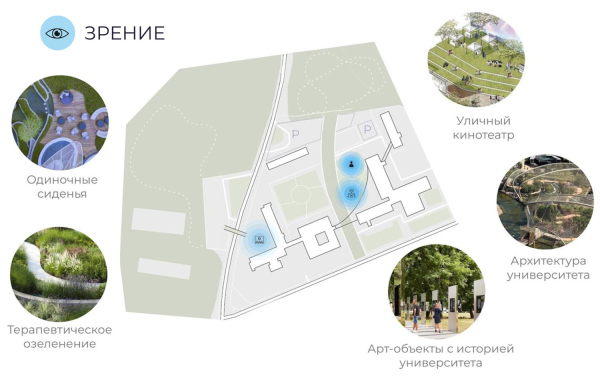 “Cognition” project, the hackathon winnerCopyright: Hackathon of the Genplan Institute of Moscow, Group 3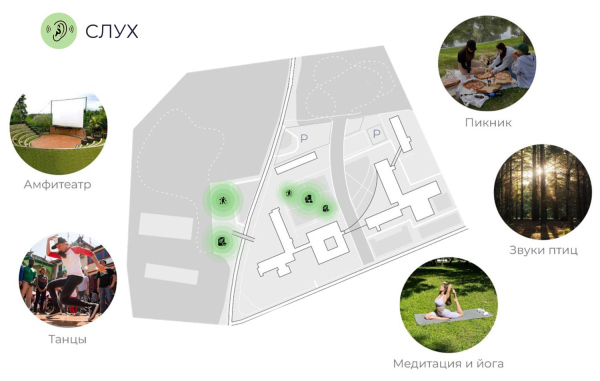 “Cognition” project, the hackathon winnerCopyright: Hackathon of the Genplan Institute of Moscow, Group 3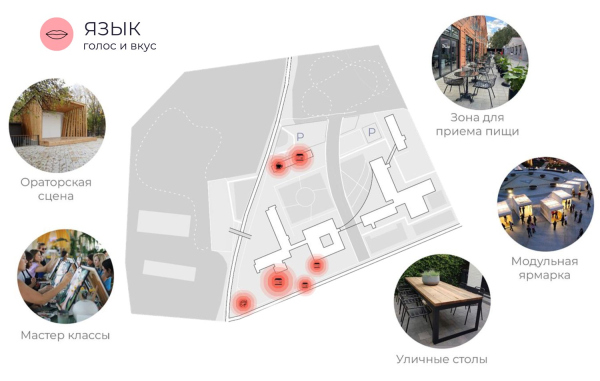 “Cognition” project, the hackathon winnerCopyright: Hackathon of the Genplan Institute of Moscow, Group 3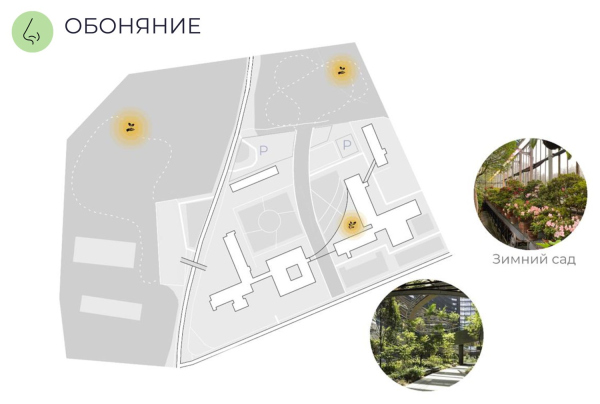 “Cognition” project, the hackathon winnerCopyright: Hackathon of the Genplan Institute of Moscow, Group 3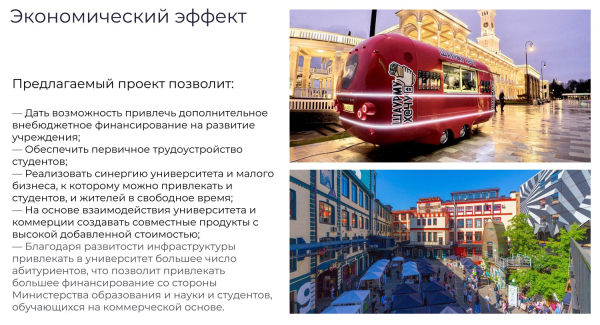 “Cognition” project, the hackathon winnerCopyright: Hackathon of the Genplan Institute of Moscow, Group 3 “Cognition” project, the hackathon winnerCopyright: Hackathon of the Genplan Institute of Moscow, Group 3The architects also made several charming, specific proposals: for instance, a bike parking area with hanging bicycles (although the area seems large enough for regular bike parking) and summer-only solitude capsules. “Cognition” project, the hackathon winnerCopyright: Hackathon of the Genplan Institute of Moscow, Group 3Nonetheless, it’s not surprising that the project impressed the jury with its thoroughness and the understated charm of its details without aiming for large-scale interventions. The only significant interventions here could be the two overpasses and the winter garden. “Cognition” project, the hackathon winnerCopyright: Hackathon of the Genplan Institute of Moscow, Group 3The “Cognition” project team was also the only one to include a detailed analysis of the campus’s transport accessibility in their urban planning review. 2nd Place / Wheat Alley Team 1, the authors of the Campus City projectCopyright: Photograph © Provided by Genplan Institute of MoscowCurators: Sergey Lukyanenko, Head of the Workshop on Urban Environment Design, Genplan Institute of Moscow; Milan Stamenkovich, Head of the Conceptual Department, Pride Union. Students: Elizaveta Usova, Nikita Pishchaev, Polina Lukianchuk, Kristina Babenko, Daria Ivanushkina, Arseniy Yezhov, Vladislav Paschinsky, Anastasia Kostenko, Daria Petrushina, Tatyana Chesnokova 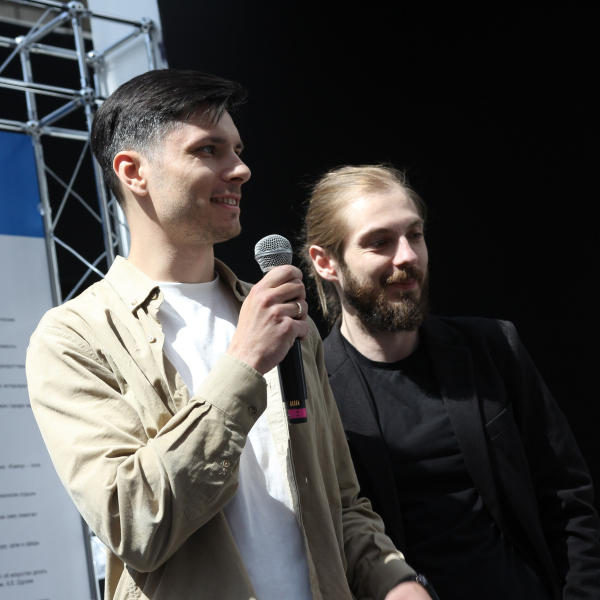 Tatiana Guk announces the winner of the hackathon at the stand of the MCA and the Genplan Institute of MoscowCopyright: Photograph © Julia Tarabarina, Archi.ru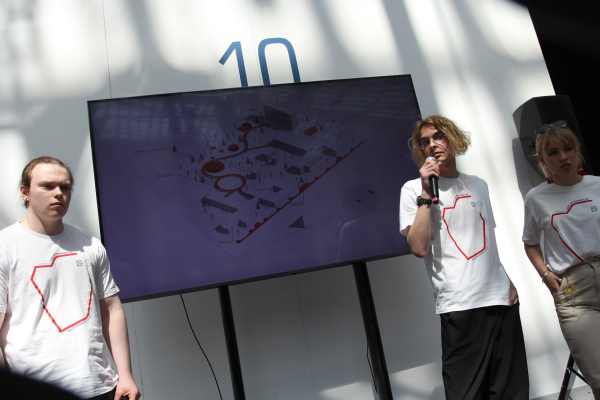 The hackathon organized by Genplan Institute of Moscow and MosComArchitectura at ArchMoscow 2024Copyright: Photograph © Julia Tarabarina, Archi.ruThis project’s distinguishing feature is the relatively active intervention of the proposed structures into the context of the area. In other words, while Team 3 only suggested points, themes, and references for further development, the second team provided very specific and detailed drawings in three types of graphics: a site plan in fashionable axonometry, an introduction styled like comics, and a 3D cartoonish character named “Universie”. 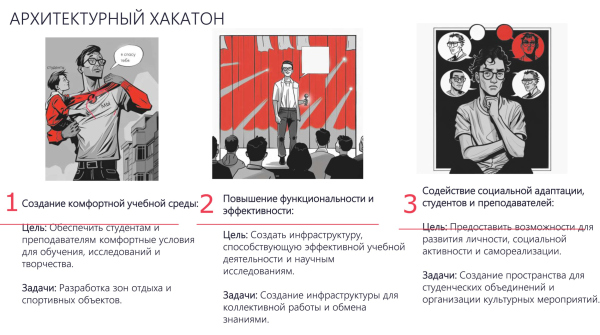 Wheat Alley, 2nd placeCopyright: Hackathon of the Genplan Institute of Moscow, Group 2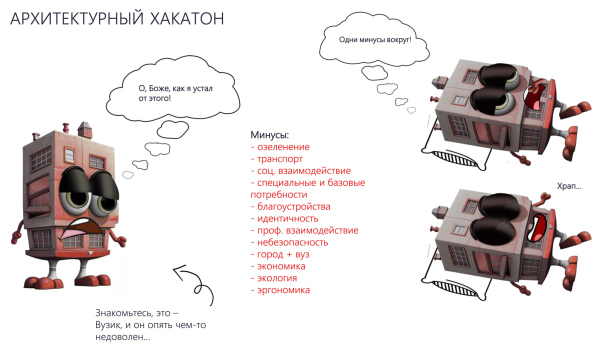 2nd Place / Wheat AlleyCopyright: Hackathon of the Genplan Institute of Moscow, Group 2In short, it was obvious that the team members could draw well and in various styles – a useful skill in our era dominated by presentations. The second team was the only one of the three that did not propose connections between the dormitory and the academic buildings, nor did they focus on creating a passage through the area from the city to the park. Their proposal distinctly reads as consisting of two parts: the first runs along the street and connects mini-cafes and entrance groups into a sort of wall. The second consists of several pavilions on the territory, connected by a winding “roof” path deeper within the area. Wheat Alley, 2nd placeCopyright: Hackathon of the Genplan Institute of Moscow, Group 2Notably, this team, in addition to the three types of quality graphics, also brought a 3D model to the presentation. The hackathon organized by Genplan Institute of Moscow and MosComArchitectura at ArchMoscow 2024Copyright: Photograph © Julia Tarabarina, Archi.ruAs mentioned, the project includes a lot of buildings: two amphitheaters, one being a sports amphitheater in addition to the stadium in its original place, another for entertainment, and a third circular “circus.” Wheat Alley, 2nd placeCopyright: Hackathon of the Genplan Institute of Moscow, Group 2The most obvious drawback of the proposal is that the “roof” path is distributed rather randomly across the area, and the architects seemed to forget about the shortest paths. The greatest strength was the presentation, which was energetic to the point of theatricality, though perhaps a bit too much at times. 2nd Place / Campus-City 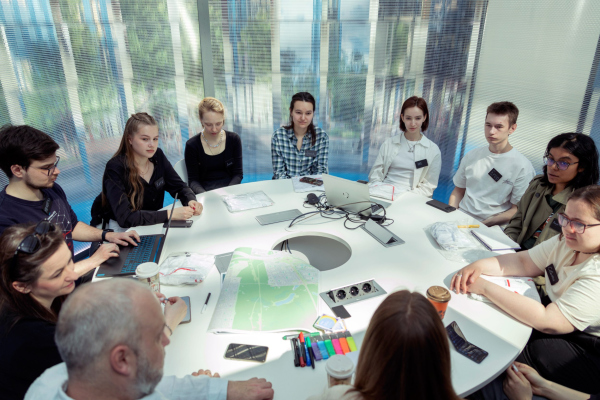 Team 1, the authors of the Campus City projectCopyright: Photograph © Provided by Genplan Institute of Moscow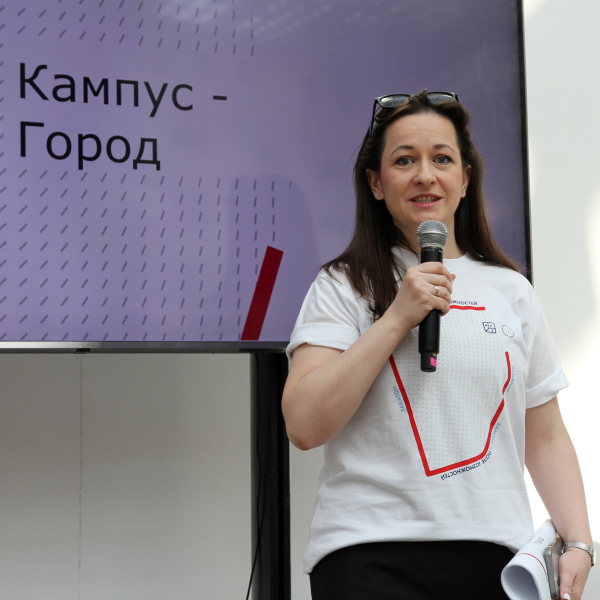 The hackathon organized by Genplan Institute of Moscow and MosComArchitectura at ArchMoscow 2024Copyright: Photograph © Julia Tarabarina, Archi.ruCurators: Anastasia Agafonkina, Viktor Obvintsev Students: Ekaterina Repan, Anna Merkulova, Alisa Murashova, Ekaterina Yatsenko, Amrita Dhali, Svetlana Vavrina, Egor Chernykh, Nikita Mazhuga The team that worked on the first day of the hackathon created a project with the most “traditional” presentation style, following the rules of master plan professionals. Campus City projectCopyright: Hackathon of the Genplan Institute of Moscow, Group 1Their proposal includes activating the park, creating a daytime thoroughfare for city residents (which could be closed at night for safety), as well as overpassing connecting the dormitory and the academic buildings. The architects expanded the existing sports ground with a larger stadium in the center of the area, acknowledging the campus’s sports specialization. They also proposed an additional entrance group on the western side, but as a ground passage rather than a bridge, and an “accent” square at the sharp corner on the western side. The difference is that the square features a fountain instead of an art object. In this project, the square becomes the main public space due to its central location: the architects cover it with a non-linear “wing” canopy. The place hosts a co-working space, museum, cafeteria, and another symmetrical wing serving as a canopy over a new academic building. Campus City projectCopyright: Hackathon of the Genplan Institute of Moscow, Group 1The project strikes a reasonable balance between new structures and their utility, despite somewhat lackluster graphics – a potential drawback that might have affected the otherwise strong proposal. 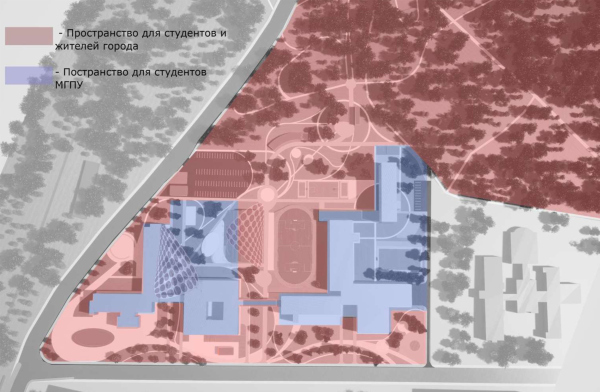 The open and closed territories. Campus City projectCopyright: Hackathon of the Genplan Institute of Moscow, Group 1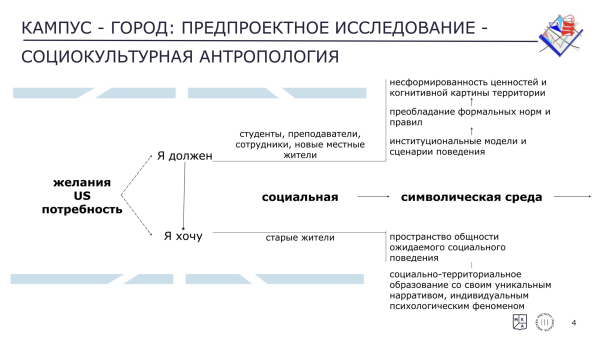 Pre-project research: sociocultural anthropology. Campus-City ProjectCopyright: Hackathon of the Genplan Institute of Moscow, Group 1The Campus-City project was most explicitly oriented towards opening the area for joint use by the university and city residents. However, it’s evident that not all solutions to the challenging task of combining openness and security were thoroughly considered by the architects. Nonetheless, this challenge is likely one of those that cannot be fully addressed within a single day. |
|
